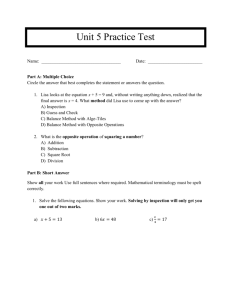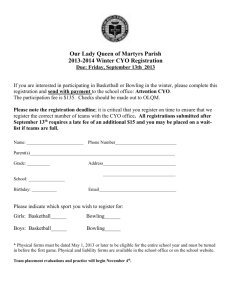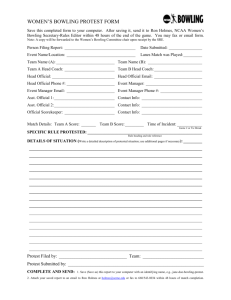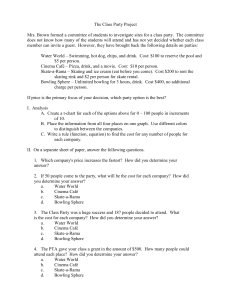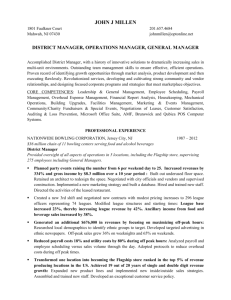Why Buy a Bowling Center? - Sandy Hansell & Associates, Inc.
advertisement
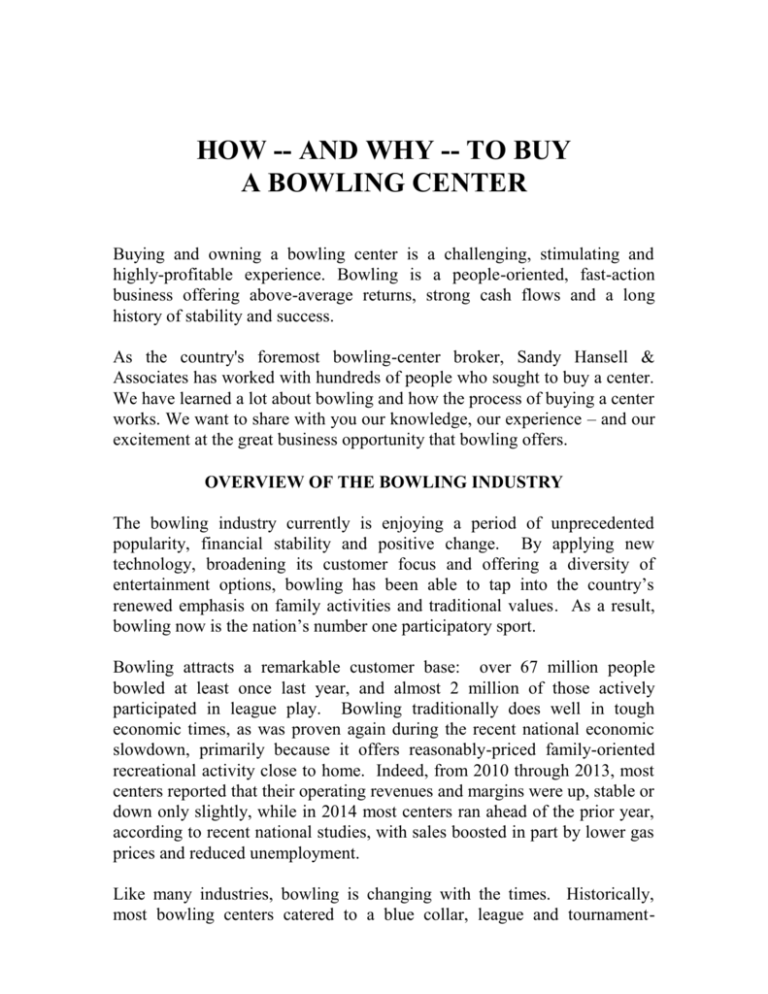
HOW -- AND WHY -- TO BUY A BOWLING CENTER Buying and owning a bowling center is a challenging, stimulating and highly-profitable experience. Bowling is a people-oriented, fast-action business offering above-average returns, strong cash flows and a long history of stability and success. As the country's foremost bowling-center broker, Sandy Hansell & Associates has worked with hundreds of people who sought to buy a center. We have learned a lot about bowling and how the process of buying a center works. We want to share with you our knowledge, our experience – and our excitement at the great business opportunity that bowling offers. OVERVIEW OF THE BOWLING INDUSTRY The bowling industry currently is enjoying a period of unprecedented popularity, financial stability and positive change. By applying new technology, broadening its customer focus and offering a diversity of entertainment options, bowling has been able to tap into the country’s renewed emphasis on family activities and traditional values. As a result, bowling now is the nation’s number one participatory sport. Bowling attracts a remarkable customer base: over 67 million people bowled at least once last year, and almost 2 million of those actively participated in league play. Bowling traditionally does well in tough economic times, as was proven again during the recent national economic slowdown, primarily because it offers reasonably-priced family-oriented recreational activity close to home. Indeed, from 2010 through 2013, most centers reported that their operating revenues and margins were up, stable or down only slightly, while in 2014 most centers ran ahead of the prior year, according to recent national studies, with sales boosted in part by lower gas prices and reduced unemployment. Like many industries, bowling is changing with the times. Historically, most bowling centers catered to a blue collar, league and tournament- oriented customer base. Now bowling is repositioning and rebranding itself to appeal to a more diversified, younger and upscale clientele which seeks an enjoyable entertainment experience in a well-appointed facility, a broader array of product offerings and a high-quality food and beverage operation. These changes are enabling most centers to broaden their customer base, achieve higher prices and become more effective competitors for their customers’ entertainment dollars and scarce spare time. The bowling business continues to be quite profitable, generating aboveaverage levels of return on investment and exceptionally strong cash flows. As a result, failures are rare and the industry’s standing among lenders is strong. In all, bowling is a $6 billion industry in the United States. Business Dimensions of a Bowling Center The unique league structure of bowling enhances the industry's appeal as a business. In most centers, about 35% to 40% of revenues are guaranteed by league contracts which reserve lanes for specific time periods each week over an eight-to-nine month season. Bowling centers produce additional revenues from other amenities such as sales of alcoholic beverages, bowling-shoe rentals, food facilities, pro shops, billiards, vending machines, video games and, of increasing importance in recent years, a wide range of other entertainment activities. Over the past 30 years, the industry has been quite profitable and has regularly generated above-average returns on investment and levels of EBITDA. During that period, the rate of bowling-center loan failures and defaults has been minimal. Indeed, because of the highly-favorable financing terms available on both commercial loans and those guaranteed by the SBA, center purchasers often achieve returns on their invested capital of well over 40%, even in their first year of ownership. As a business and investment, bowling centers also provide several additional advantages: 2 The league structure provides remarkably stable and predictable levels of revenue and cash flow. Bowling is among the relatively few industries that thrive on "recurring revenues." Many financial analysts endorse businesses that must sell a customer only once to create an automatic, on-going stream of future revenues by providing continuing services to that customer. In bowling, once a league signs a contract with a center, that league should continue to patronize the center indefinitely without the need of "selling" it again, so long as the center services it properly. Bowling is a cash business with no receivables. Because of the strong cash flow, a bowling business needs little working capital, and funds tied up in inventories are minimal. Bowling centers have excellent operating leverage; once basic expenses are covered, an unusually large percentage of each additional dollar of revenue flows through to the bottom line. A bowling center runs little risk of functional obsolescence; the design and function of the major components of a center rarely change, and modest ongoing expenditures in decor and appearance can keep a facility fresh and modern for many years. With proper maintenance, the basic equipment normally will function efficiently for well over 20 years. Bowling centers normally provide significant tax shelter created by substantial investments in equipment and often in buildings. Bowling potentially appeals to virtually all segments of this country's demographic base. A highly-social activity, it is enjoyed by people of all ages, physical abilities and skill levels. Families, employee organizations and other groups frequently bowl together for fun, fitness and friendly competition. The industry benefits from this country's expanding desire for wholesome recreation and, particularly as more bowling centers diversify by adding ancillary activities for family-fun participatory activities. 3 Finding the Right Center Bowling centers come in all sizes, ages, locations and layouts. Here are a few guidelines for selecting the right center for you. One of the major considerations is how successful the center has been under the current owner. Some buyers insist a center must be highly- profitable from the first day; others like centers that are under-utilized so they can build them up. In general, the more successful centers cost more but you buy more; when you buy one that is not performing at its expected level, you pay less, wait longer for your return and end up trading your own sweat (of which you will produce plenty as you improve the operation) for equity. However, the potential for larger profits in the long run obviously is greater in such "turnarounds.” Expect to devote the time necessary to find and purchase your own business. We get dozens of calls and letters every week from people who have "always dreamed of owning a bowling center." Frankly, in most cases, we wind up dealing with more fantasy than reality. Once we are convinced a buyer is serious and has the capacity to buy, we will spend a good deal of time with him. We are not impressed with people who repeatedly ask for volumes of information and never bother to make a trip to see a center. We gladly will give you the full resources of our organization, but only when you take the time and effort to follow through properly. Be sure owning a business is right for you. Are you ready to leave your present situation? Are you comfortable being your own boss? Are you willing to put long hours, including nights and weekends, into running the business? Are you a "people person" with skills in promotion, sales, employee relations and marketing? Are you comfortable with financial statements, taxes and figures? Can you handle a business which is really several businesses under one roof (restaurant, lounge, pro shop, video arcade, bowling)? 4 Be flexible in your thinking about location. Bowling centers do not exist on every block. To find one you like, you may have to move to another city or another state. The wider the area you consider, the more opportunities you will have to buy the right center. Similarly, the more flexible you can be with other criteria (type of equipment, amenities, real estate owned or leased, etc.) the faster you will find a center. Don't expect perfection in any property. No business opportunity is without problems or difficulties. The successful purchaser recognizes and accepts them and carefully plans to overcome them. Bowling is a "management-intensive" business. Levels of revenue and profitability are determined more by the quality of the management applied to a center than by its location, equipment or appearance. Some current owners are not good promoters, managers or businessmen. Many have been in the business for many years and are burned out. New owners often improve a business by being more aggressive and innovative and by working harder. Therefore, in analyzing a center, you should calculate the revenues and expenses you anticipate once you take over the operation. Like all new owners, you will make changes and improvements in your center, and you will apply your own levels of energy, promotional skills and imagination to the operation. As Shakespeare said, "What's past is prologue"; what really matters now is how well this business will do in your hands beginning the day after closing, and that will be determined by your ability, energy and creativity. Have your cash in liquid form. When any business comes on the market, the owner wants it sold now. Timing can be critical. If you find the center you like, and then scurry about trying to sell some 5 property or raise money from investors, in all probability you will be too late; if it is a good center, it will be snapped up long before you raise your funds. Anticipate that you will need about 20% to 30% of the total purchase price in cash, plus additional funds for closing costs and perhaps a small amount of working capital (depending upon the time of year you close). That money should be at your fingertips. Be truthful in telling us how much you have readily available to invest. There's no point in your wasting your time looking at properties that are out of reach. In most cases, we recommend that your down payment money should be in un-borrowed funds because it places too much of a strain on the business to generate enough to pay the remainder of the purchase money obligations, repay a loan for the down payment and provide a living wage for the principals as well. If you raise money from partners, remember that the larger the number, the more questions you will have to answer. Be sure they actually have the money they say they do. Also, they must understand that bowling is a long-term investment and they may not receive returns of any consequence in the early years. Here’s How We Operate We want you to know something about how we operate at Sandy Hansell & Associates. Our internal operating manual clearly states these policies and we live by them: We won't sell a center to anyone whom we don't believe will succeed. We don't want any failures on our record. We will never "high pressure" a client. We will never have an undisclosed financial interest in any center we work on. 6 At all times we recognize we are dealing with people's careers and livelihoods, and we will act responsibly with this in mind. Your Responsibilities to Us Now it is only fair to tell you what we expect from you. After all, if this process is to be successful, we must work together as a team. First, we must ask that you respect the confidentiality of the entire situation. As a qualified buyer, you are given access to sensitive information about a bowling center and the seller's personal situation. Treat that information as you would want your own confidential data treated. That is our – and your – obligation to the seller. For that reason, we insist that you sign an agreement in which you promise to keep all such information confidential. Second, we ask you tell us about yourself, your background and your financial capacity by completely filling out both sides of our “Personal History and Financial Statement.” We cannot work with you effectively unless we have this information. Please tell us the truth about your situation; we'll find out sooner or later anyway. Finally, if we tell you about a center, we expect you to work only through us, not through another broker or anyone else. Furthermore, we do not want you to deal with the owner directly in any case. This stipulation works both to your advantage and ours, and it particularly protects your negotiating position which is always stronger if you are somewhat removed from the day-to-day bargaining process. A Word of Explanation When we have a center listed for sale, that means we represent the owner of that property; we are under an obligation imposed by law to do the best we can do for him. He pays our fee. We do not represent the buyer. 7 Naturally we always make every effort to treat our buyers with absolute fairness and integrity. We recognize that after the sale is completed, the buyer will become part of the bowling industry and we certainly want all of our buyers to speak well of us. In fact, over the years, we must have succeeded in treating our buyers satisfactorily because almost every one has said nice things about us after the closing, and we are very proud of that. In some cases, we may specifically agree to represent a buyer, in which event we will sign a formal “Buyer Representation” contract. Absent such agreement, however, please remember that while we will work closely with you, we represent the seller and our job is to look after his best interests, not yours. How the Process Works After you have reviewed basic information about a center that sounds good to you, the next step will be for you to chat in person or by telephone with one of our experienced brokers to learn more about the specific business and the bowling industry as a whole. We will help you understand this business. Then it will be time for you to visit the center you want to buy. The first time you probably will go by yourself. You will not identify yourself nor meet the owner; the purpose will be to look around briefly and to get a "feel" for the facility. We also will arrange for you to visit another center either here or in your area to learn about the bowling business. During every visit to a center, you must handle yourself with absolute discretion. In almost every case, the staff and customers of a center do not know it is for sale. The owner fears adverse reaction if word leaks out prematurely. Therefore, you must be restrained in asking questions. Under no circumstances should you ever say to anyone that the center is for sale. We have seen cases where a slip of the tongue by a prospective purchaser so upset the seller that he took the center off the market and the buyer lost out. 8 Once you have seen the center and have decided that you like what you see, the next step will be to have us arrange for you to get a closer inspection of the center escorted by the owner. Depending upon the situation, one of our staff may accompany you. The old cliché “timing is everything” holds true when buying a center. The cardinal rule in this game is when you see a property you like, go for it. The reason for that rule grows out of the current bowling center marketplace: Right now there are more buyers than quality centers available. Information on each center normally is sent to a number of buyers at the same time. The prize will go to the one who acts first. By all means, don't rush or don't do anything hasty, but also don’t hesitate when you see something you like. The Negotiations Let's assume that you have found the right center, have visited it, checked out the market and are ready to proceed. What happens now? This is the sequence: 1. We begin preliminary negotiations to establish the ultimate purchase price and structure of the transaction. A bowling center sale can be set up in many different ways, e.g. an outright sale of the real estate, equipment and business; a sale of the equipment and business coupled with a lease of the real estate; a purchase of the business coupled with a lease of the real estate and equipment, and more. Each of these approaches has many possible variations. In recommending a particular structure for a specific transaction, we are guided by the needs and wants of the parties, the characteristics of the particular situation and the financial and likely tax consequences to both the buyer and the seller. Throughout the process, we are guided by one basic principle: a successful sale must be equitable to both buyer and seller. 2. When we feel the parties are close, we will prepare (without charge) an offer which puts down on paper what the parties have been talking about and which contains all of the significant terms of 9 the sale. We find that once this paper is on the table, negotiations tend to move rapidly to conclusion. Once any necessary changes are made and everyone has signed it, this document becomes the basic agreement of sale. 3. Throughout the entire process, we will handle all negotiations so each party can maintain its own negotiating position. When we feel the time is right, we may call for a face-to-face meeting to resolve some points. 4. At some stage in the process, usually within a few days after the purchase agreement is signed, you will have an opportunity to inspect the building and equipment closely to determine its condition. This is an important part of the process because, in most cases, the center is sold "as is" and you don't want to face any unexpected large capital expenditures soon after closing. Carefully check the roof, HVAC system, parking lot, pinspotters, lanes, refrigeration, etc. If you are not knowledgeable in these areas, bring in outside experts to help you. 5. We recommend that every buyer retain his or her own attorney to read over the documents and his or her own CPA to review the financials and the tax implications of the purchase to the buyer. We are happy to work closely with your advisors to be sure everything is in order. 6. Once the purchase agreement is signed by all parties and you have completed your inspection of the center, the next step is to apply for financing. In most cases, the best source for obtaining a loan is a local bank which is familiar with the center’s location and market (and which wants to handle the center’s deposits in the future). Depending upon the situation, the bank may choose to have a portion of the loan guaranteed by the S.B.A. which requires additional paperwork. Alternatively, in some situations, we may be able to direct you to financing sources experienced in bowling. Occasionally – but not often – the seller may carry a small portion of the debt. 10 The lender will carefully analyze the seller’s financial statements and tax returns to be sure the business will be able to service the new debt. In addition, the bank will want an appraisal of the center to determine its underlying real estate value. The lender also will review your personal financial statements and credit history, and probably will ask you (and perhaps some or all of your partners) to personally guarantee the new loan. The procedure can be arduous at times, but it is a necessary part of the center purchasing process. 7. During this process, a number of problems may well emerge which appear to make the deal impossible. Keep cool and don't worry; this is normal. One of the broker's primary tasks is to overcome the obstacles; fortunately, we've been at this long enough that generally we can find a way to solve the problems that pop up. So don't be surprised if you find yourself encountering a seeming roadblock; it's not unusual and, in all probability, it will all work out for you. 8. Before closing, attorneys for each side will prepare a series of supplementary documents (deeds, bills of sale, mortgages, perhaps an expanded sales contract, etc.). Title work may be necessary, the liquor-license transfer process will be triggered, other details may require attention. We help at each step along the way. 9. Just before closing, an inventory will be taken. At closing, dozens of documents will be signed, money will change hands, and you will walk out the door to start your new adventure as a bowling proprietor. A Final Thought We have saved one of the most important points to the end to emphasize it. We call it the "Oh My God What Am I Doing?" syndrome. One of our friends refers to it as "stomach-ache time.” 11 Others call it "buyer's remorse" or just plain old "getting cold feet." It's a natural part of the process. Obviously there are risks in buying any business. If you didn't have second thoughts somewhere in this period, you wouldn't be normal. Everyone goes through this experience so be prepared because you probably will, too. Of course, there are some cures for this disease: Remember that while the risks may be great, so are the financial, emotional and psychological rewards. Follow the steps outlined in this pamphlet to reduce the risks and help you feel confident that you are doing the right thing for you. 07/12 Finding the Right Center Bowling centers come in all sizes, ages, locations and layouts. Here are a few guidelines for selecting the right center for you. One of the major considerations is how successful the center has been under the current owner. Some buyers insist a center must be highly- profitable from the first day; others like centers that are under-utilized so they can build them up. In general, the more successful centers cost more but you buy more; when you buy one that is not performing at its expected level, you pay less, wait longer for your return and end up trading your own sweat (of which you will produce plenty as you improve the operation) for equity. However, the potential for larger profits in the long run obviously is greater in such "turnarounds.” Expect to devote the time necessary to find and purchase your own business. We get dozens of calls and letters every week from people who have "always dreamed of owning a bowling center." Frankly, in most cases, we wind up dealing with more fantasy than reality. Once we are convinced a buyer is serious and has the capacity to buy, we will spend a good deal of time with him. We 12 are not impressed with people who repeatedly ask for volumes of information and never bother to make a trip to see a center. We gladly will give you the full resources of our organization, but only when you take the time and effort to follow through properly. Be sure owning a business is right for you. Are you ready to leave your present situation? Are you comfortable being your own boss? Are you willing to put long hours, including nights and weekends, into running the business? Are you a "people person" with skills in promotion, sales, employee relations and marketing? Are you comfortable with financial statements, taxes and figures? Can you handle a business which is really several businesses under one roof (restaurant, lounge, pro shop, video arcade, bowling)? Be flexible in your thinking about location. Bowling centers do not exist on every block. To find one you like, you may have to move to another city or another state. The wider the area you consider, the more opportunities you will have to buy the right center. Similarly, the more flexible you can be with other criteria (type of equipment, amenities, real estate owned or leased, etc.) the faster you will find a center. Don't expect perfection in any property. No business opportunity is without problems or difficulties. The successful purchaser recognizes and accepts them and carefully plans to overcome them. Bowling is a "management-intensive" business. Levels of revenue and profitability are determined more by the quality of the management applied to a center than by its location, equipment or appearance. Some current owners are not good promoters, managers or businessmen. Many have been in the business for many years and are burned out. New owners often improve a business by being more aggressive and innovative and by working harder. 13 Therefore, in analyzing a center, you should calculate the revenues and expenses you anticipate once you take over the operation. Like all new owners, you will make changes and improvements in your center, and you will apply your own levels of energy, promotional skills and imagination to the operation. As Shakespeare said, "What's past is prologue"; what really matters now is how well this business will do in your hands beginning the day after closing, and that will be determined by your ability, energy and creativity. Have your cash in liquid form. When any business comes on the market, the owner wants it sold now. Timing can be critical. If you find the center you like, and then scurry about trying to sell some property or raise money from investors, in all probability you will be too late; if it is a good center, it will be snapped up long before you raise your funds. Anticipate that you will need about 20% to 30% of the total purchase price in cash, plus additional funds for closing costs and perhaps a small amount of working capital (depending upon the time of year you close). That money should be at your fingertips. Be truthful in telling us how much you have readily available to invest. There's no point in your wasting your time looking at properties that are out of reach. In most cases, we recommend that your down payment money should be in un-borrowed funds because it places too much of a strain on the business to generate enough to pay the remainder of the purchase money obligations, repay a loan for the down payment and provide a living wage for the principals as well. If you raise money from partners, remember that the larger the number, the more questions you will have to answer. Be sure they actually have the money they say they do. Also, they must 14 understand that bowling is a long-term investment and they may not receive returns of any consequence in the early years. Here’s How We Operate We want you to know something about how we operate at Sandy Hansell & Associates. Our internal operating manual clearly states these policies and we live by them: We won't sell a center to anyone whom we don't believe will succeed. We don't want any failures on our record. We will never "high pressure" a client. We will never have an undisclosed financial interest in any center we work on. At all times we recognize we are dealing with people's careers and livelihoods, and we will act responsibly with this in mind. Your Responsibilities to Us Now it is only fair to tell you what we expect from you. After all, if this process is to be successful, we must work together as a team. First, we must ask that you respect the confidentiality of the entire situation. As a qualified buyer, you are given access to sensitive information about a bowling center and the seller's personal situation. Treat that information as you would want your own confidential data treated. That is our – and your – obligation to the seller. For that reason, we insist that you sign an agreement in which you promise to keep all such information confidential. Second, we ask you tell us about yourself, your background and your financial capacity by completely filling out both sides of our “Personal History and Financial Statement.” We cannot work with 15 you effectively unless we have this information. Please tell us the truth about your situation; we'll find out sooner or later anyway. Finally, if we tell you about a center, we expect you to work only through us, not through another broker or anyone else. Furthermore, we do not want you to deal with the owner directly in any case. This stipulation works both to your advantage and ours, and it particularly protects your negotiating position which is always stronger if you are somewhat removed from the day-to-day bargaining process. A Word of Explanation When we have a center listed for sale, that means we represent the owner of that property; we are under an obligation imposed by law to do the best we can do for him. He pays our fee. We do not represent the buyer. Naturally we always make every effort to treat our buyers with absolute fairness and integrity. We recognize that after the sale is completed, the buyer will become part of the bowling industry and we certainly want all of our buyers to speak well of us. In fact, over the years, we must have succeeded in treating our buyers satisfactorily because almost every one has said nice things about us after the closing, and we are very proud of that. In some cases, we may specifically agree to represent a buyer, in which event we will sign a formal “Buyer Representation” contract. Absent such agreement, however, please remember that while we will work closely with you, we represent the seller and our job is to look after his best interests, not yours. How the Process Works After you have reviewed basic information about a center that sounds good to you, the next step will be for you to chat in person or by telephone with one of our experienced brokers to learn more about the specific business and the bowling industry as a whole. We will help you understand this business. 16 Then it will be time for you to visit the center you want to buy. The first time you probably will go by yourself. You will not identify yourself nor meet the owner; the purpose will be to look around briefly and to get a "feel" for the facility. We also will arrange for you to visit another center either here or in your area to learn about the bowling business. During every visit to a center, you must handle yourself with absolute discretion. In almost every case, the staff and customers of a center do not know it is for sale. The owner fears adverse reaction if word leaks out prematurely. Therefore, you must be restrained in asking questions. Under no circumstances should you ever say to anyone that the center is for sale. We have seen cases where a slip of the tongue by a prospective purchaser so upset the seller that he took the center off the market and the buyer lost out. Once you have seen the center and have decided that you like what you see, the next step will be to have us arrange for you to get a closer inspection of the center escorted by the owner. Depending upon the situation, one of our staff may accompany you. The old cliché “timing is everything” holds true when buying a center. The cardinal rule in this game is when you see a property you like, go for it. The reason for that rule grows out of the current bowling center marketplace: Right now there are more buyers than quality centers available. Information on each center normally is sent to a number of buyers at the same time. The prize will go to the one who acts first. By all means, don't rush or don't do anything hasty, but also don’t hesitate when you see something you like. The Negotiations Let's assume that you have found the right center, have visited it, checked out the market and are ready to proceed. What happens now? This is the sequence: 17 1. We begin preliminary negotiations to establish the ultimate purchase price and structure of the transaction. A bowling center sale can be set up in many different ways, e.g. an outright sale of the real estate, equipment and business; a sale of the equipment and business coupled with a lease of the real estate; a purchase of the business coupled with a lease of the real estate and equipment, and more. Each of these approaches has many possible variations. In recommending a particular structure for a specific transaction, we are guided by the needs and wants of the parties, the characteristics of the particular situation and the financial and likely tax consequences to both the buyer and the seller. Throughout the process, we are guided by one basic principle: a successful sale must be equitable to both buyer and seller. 2. When we feel the parties are close, we will prepare (without charge) an offer which puts down on paper what the parties have been talking about and which contains all of the significant terms of the sale. We find that once this paper is on the table, negotiations tend to move rapidly to conclusion. Once any necessary changes are made and everyone has signed it, this document becomes the basic agreement of sale. 3. Throughout the entire process, we will handle all negotiations so each party can maintain its own negotiating position. When we feel the time is right, we may call for a face-to-face meeting to resolve some points. 4. At some stage in the process, usually within a few days after the purchase agreement is signed, you will have an opportunity to inspect the building and equipment closely to determine its condition. This is an important part of the process because, in most cases, the center is sold "as is" and you don't want to face any unexpected large capital expenditures soon after closing. Carefully check the roof, HVAC system, parking lot, pinspotters, lanes, refrigeration, etc. If you are not knowledgeable in these areas, bring in outside experts to help you. 18 5. We recommend that every buyer retain his or her own attorney to read over the documents and his or her own CPA to review the financials and the tax implications of the purchase to the buyer. We are happy to work closely with your advisors to be sure everything is in order. 6. Once the purchase agreement is signed by all parties and you have completed your inspection of the center, the next step is to apply for financing. In most cases, the best source for obtaining a loan is a local bank which is familiar with the center’s location and market (and which wants to handle the center’s deposits in the future). Depending upon the situation, the bank may choose to have a portion of the loan guaranteed by the S.B.A. which requires additional paperwork. Alternatively, in some situations, we may be able to direct you to financing sources experienced in bowling. Occasionally – but not often – the seller may carry a small portion of the debt. The lender will carefully analyze the seller’s financial statements and tax returns to be sure the business will be able to service the new debt. In addition, the bank will want an appraisal of the center to determine its underlying real estate value. The lender also will review your personal financial statements and credit history, and probably will ask you (and perhaps some or all of your partners) to personally guarantee the new loan. The procedure can be arduous at times, but it is a necessary part of the center purchasing process. 7. During this process, a number of problems may well emerge which appear to make the deal impossible. Keep cool and don't worry; this is normal. One of the broker's primary tasks is to overcome the obstacles; fortunately, we've been at this long enough that generally we can find a way to solve the problems that pop up. So don't be surprised if you find yourself encountering a seeming roadblock; it's not unusual and, in all probability, it will all work out for you. 8. Before closing, attorneys for each side will prepare a series of supplementary documents (deeds, bills of sale, mortgages, perhaps 19 an expanded sales contract, etc.). Title work may be necessary, the liquor-license transfer process will be triggered, other details may require attention. We help at each step along the way. 9. Just before closing, an inventory will be taken. At closing, dozens of documents will be signed, money will change hands, and you will walk out the door to start your new adventure as a bowling proprietor. A Final Thought We have saved one of the most important points to the end to emphasize it. We call it the "Oh My God What Am I Doing?" syndrome. One of our friends refers to it as "stomach-ache time.” Others call it "buyer's remorse" or just plain old "getting cold feet." It's a natural part of the process. Obviously there are risks in buying any business. If you didn't have second thoughts somewhere in this period, you wouldn't be normal. Everyone goes through this experience so be prepared because you probably will, too. Of course, there are some cures for this disease: Remember that while the risks may be great, so are the financial, emotional and psychological rewards. Follow the steps outlined in this pamphlet to reduce the risks and help you feel confident that you are doing the right thing for you. 12/15 20


